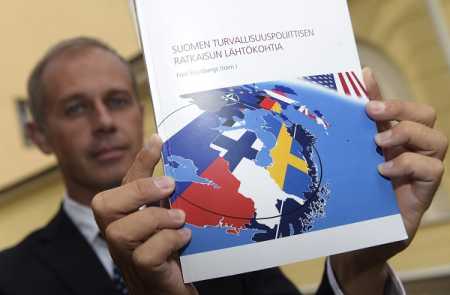
Fri, 01 Jul, 2016 12:05:30 AM
FTimes – STT Report, Jul 1

Senior researcher Fred Blombergs of the Finnish Defence Forces Research Institute in a book publication ceremony on security policy in Helsinki on Thursday. Photo Lehtikuva.
Experts assess Britain’s exit from the European Union will not have any major impact on Finland’s security policy.
The security policy experts however emphasise that the dust has not yet cleared, and estimates of the effects are not yet firm.
“[The EU without Britain will be] smaller but somewhat more uniform,” remarked National Defence University special researcher Tommi Koivula.
He pointed out that the country has not recently been interested in the development of a common security policy.
“If and when the UK leaves, the Germany-France-Poland axis will probably move ahead with their common security goals. Cooperation with the British will continue one way or another.
Britain has in no way sent a message that they wish to separate themselves from Europe’s security policy,” Koivula told the news agency STT.
“The most interesting thing is whether there is an expected domino effect as the wave of the referendum, or an even bigger chain reaction. It’s already affecting quite a bit,” Koivula added.
Finland has applied for European security, and the UK is a major military superpower within the EU, said senior researcher Fred Blombergs of the Finnish Defence Forces Research Institute.

Professor Hanna Ojanen of University of Tampere. File Photo Lehtikuva.
According to him, Brexit weakens the EU’s common security and defence policies and, at the same time, the importance of the security sought by Finland from the EU has increased in the short term.
European joint defence will be carried out through military alliance NATO, Blombergs said in an email.
Proponents of NATO, according to Blombergs, may view Brexit as a reason to justify the need for membership.
President Sauli Niinistö earlier this week stated that Brexit would not bring Finland closer to NATO membership.
Professor Hanna Ojanen of University of Tampere said the initial assessment of Brexit was “quite fast and a bit tendentious.”
The idea was the EU weakens security policy-wise and NATO strengthens and this may draw conclusions.
According to Ojanen, NATO and the EU go hand in hand and need each other. If one weakens, the other also weakens.
Ojanen, however, does not see Brexit having impact on possible Finnish membership of NATO.
|
|
|
Founding Chief Editor : Ofiul Hasnat, Published by Dr. Markku Broas on behalf of Development Media Oy, Tievakatu 3 As 28, 96100 Rovaniemi, Finland. E-mail : [email protected]
|